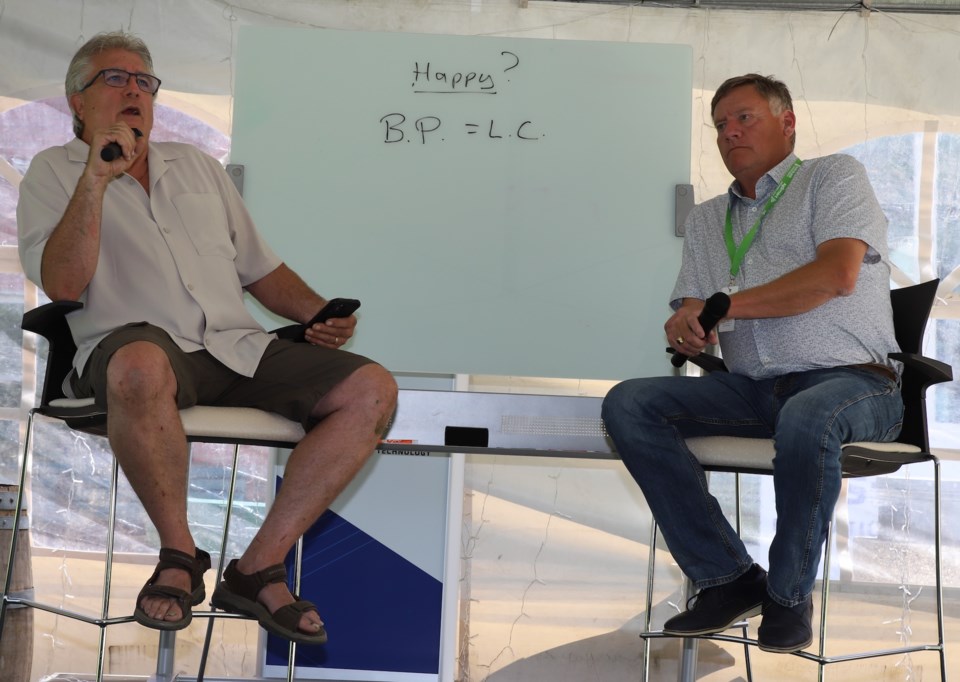OLDS — Succession planning – figuring out how you’re going to pass the farm on to the next generation – is something you should do early on in your career; otherwise it could be too late.
That was the message from two speakers, Scott Dickson (retired) and Reg Shandro of MNP during AgSmart, Agri-Trade Equipment Expo Group's educational agriculture expo, which ran from July 29-31 at Olds College.
The title of the session was How can the Next Generation Afford Anything?
Dickson shared one secret.
“Profit fixes all that ails you,” he said, adding that if you want to create a succession plan, “you need to make money to allow that to happen. And you can't wait till the last five years to make the money to make it happen. So you better be doing it all the time.”
Shandro said your succession plan needs to be determined from your expectations around three things: your wallet, your your heart and your head.
The wallet is the money you’ve made or anticipate to make, the head is the story and legacy of the farm and the heart is love for the farm and the business.
“The thing is, if the heart's not right, if the heart's not healed, it always trumps everything else. From your heart's perspective, can you afford not to (keep farming)?”
Shandro also said when it comes to succession, no one plan works for every family.
“There is not one answer fits all, and the variables are within your own situation,” he said. “It doesn't matter if the average return on equity is X or Y, What are your numbers?”
Both Dixon and Shandro said a big motivator for farm families to create a succession plan is taxation.
Shandro said tax concerns should be the third priority when creating such a plan, although he conceded it’s probably the number 1 reason farmers decide to create one.
Dixon agreed.
“I think most accountants would say this, don't let the tax tail wag the dog, right? You’ve got great rules that can manipulate tax for farmers,” he said.
“It shouldn't be that driving force, and that's why I said succession planning is not a tax plan. A tax plan might fall out of a succession plan, if you're truly doing it (right).”
Dixon said too many farmers leave the question of farm succession far too long.
“In the last two or three years, I had four clients under the age of 60 die prematurely. So I start and now tell those stories to motivate,” he said, noting that if a plan hasn’t been created, “somebody inherits that mess.”
“The girl that drove me over here today said they just went through their plan. And I said, ‘so tell me the ages of your husband and his dad.’ ‘Eighty and 50.’ That's got to stop. That has to stop,” he said.
Shandro said an important facet of the plan has to be figuring out how the estate will be shared between farming and non-farming kids.
“So when you have non-farming kids and you haven't done anything, and you're surprised when you have four kids, and then they all want a piece of it, and you go, ‘OK,’ well, you sort of created that nightmare,” he said.
The audience was told that insurance can be a way of providing for non-farm kids. However, that has to be set in place when you’re young “because it's cheaper when you're young,” Dixon said.
Shandro also warned that if the price for crops – canola, for example – is high, that’s a bad time to make succession decisions.
“More detrimental decisions have been made with canola at the top end of the market,” he said. “Very few bad decisions are made when the commodity prices are low, because you're hunkering down and you're in conservative mode.”
Tracy Gardner, the MC for the session, said some really good friends of hers in the Lacombe area have just “rolled over into the third generation.”
“The thing that has made them successful is, one, they have an excellent relationship with their team, but two, they have two meetings at the kitchen table a year with all of the family members," she said. "And they discuss budget. They discuss roles and responsibilities.
“It's like an AGM for their business, and that has been intentional, and it has worked for that family, to be able to make sure that the people sitting at the table have accountability.
“I just wanted to share that, because I think that that's one of the tips and tricks to success for our generation, is to be willing to sit at the table and put our time in as well,” she said.



